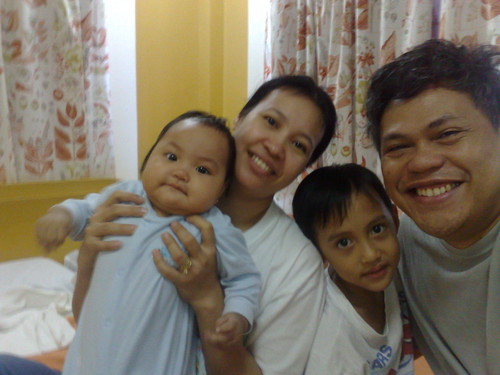Give generously to each other as we honor others above ourselves, building a family who loves, encourages and enjoys one another. As a family we will give generously to others, instilling a purpose that is outward and sacrificial in God’s love.One of the most common objections encountered by parents who go into homeschooling is this: "How about the socialization of your kid?" To answer that question, here's a picture for immediate gratification:
Source: Waiting for Perfect @ aisforanteater.com
 |
| Kids socialize first with parents and young siblings. No peer pressure. No bully. Just love and caring, and lots of fun together. |
What is socialization by the way?
Socialization is a term used by sociologists, social psychologists, anthropologists, politicians and educationalists to refer to the process of inheriting norms, customs and ideologies. It may provide the individual with the skills and habits necessary for participating within their own society; a society itself is formed through a plurality of shared norms, customs, values, traditions, social roles, symbols and languages. Socialization is thus ‘the means by which social and cultural continuity are attained’.Homeschooling is more than just "another educational system" but a philosophy by itself. It reinforces the age old concept of society as a plurality of "shared norms, customs, values, traditions..." and that it strengthens the role of the family as the basic unit of society.
Source: wikipedia.com
In human context, a family (from Latin: familiare) is an exclusive group of people who share a close relationship —a unit typically (or "traditionally") composed of a mated couple and their dependent children in co-residence.Homeschooling snatches the "prime time" of a child's day and keeps that time within, mixing family and education in one fun and loving experience. He still has friends outside home, but his main social group is the home.
Source: wikipedia.com
But how do homeschooled do when they grow up? Won't they become anti-social? If a child's experience with socialization is fun and loving, would you expect him to be anti-social when he grows up? What do you think?
Let me quote here Dr. Bill Bennett (former US Secretary of Education under President Ronald Reagan) as cited by Dr. James Dobson in his book Bringing Up Boys:
The kids in public schools score, appropriately enough, at the fiftieth percentile on tests of academic competence. In other words, their combined score is "average." Homeschoolers, however, are at the eighty-seventh percentile---for about one-sixth the cost. These homeschool kids are getting into colleges that their parents want them to attend, and the program produces a high degree of parental and child satisfaction.
One other very interesting thing we've just found out about these wonderful kids is that they tend to be active in political affairs. They tend to be joiners. They tend to be people who are engaged in civic activities---just the opposite of what people have said.
Source: Dr. James Dobson (2001), Bringing Up Boys, p226
RELATED POSTS:
My Son Just Graduated from Prep in Homeschool
Ten Heart-Shaking Insights from James Dobson
![Fatherhood [dot] Win](http://4.bp.blogspot.com/-Zp0aJrEf_tA/Vzp_zbierhI/AAAAAAAALLo/m97Pks3DQmwmVpxM7Ckm_ZR9Q1f7uuu6wCK4B/s880/Blog%2BHeader%2BDesign%2Bv2.png)
No comments:
Post a Comment